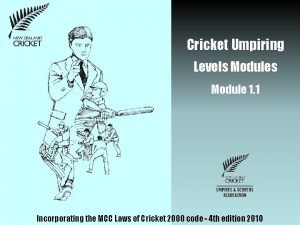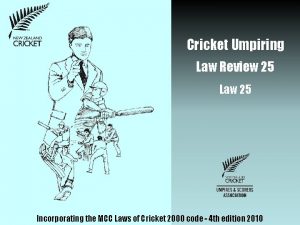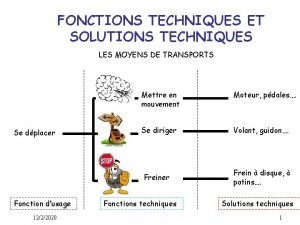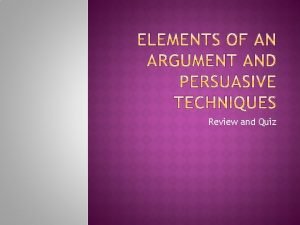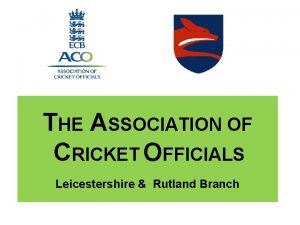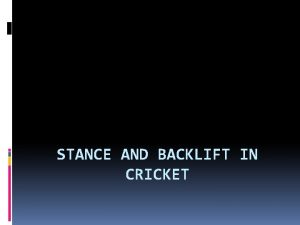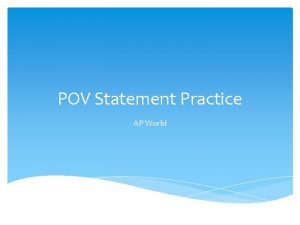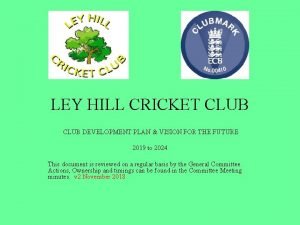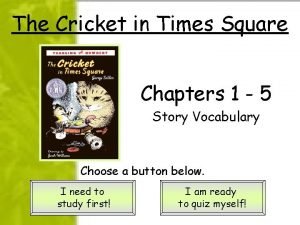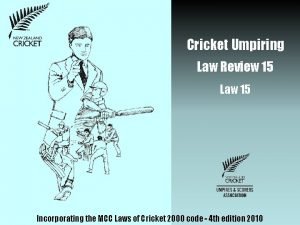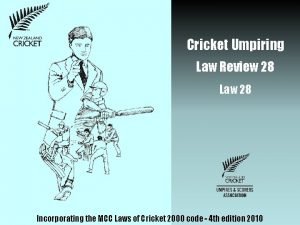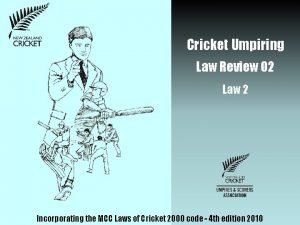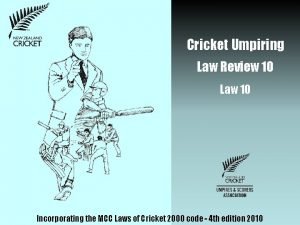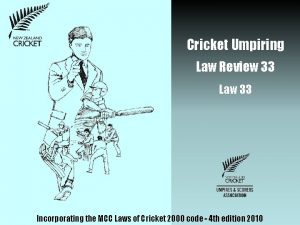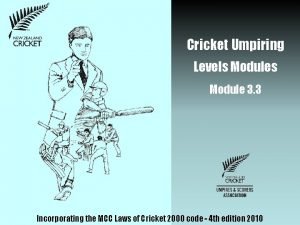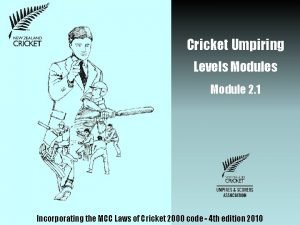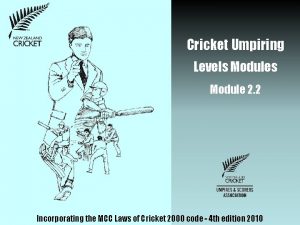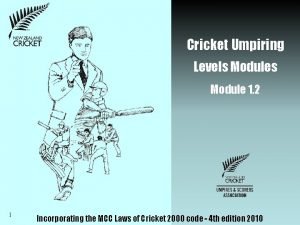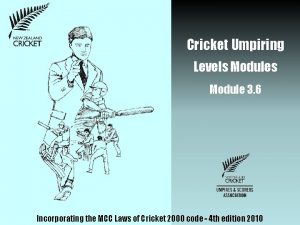Cricket Umpiring Law Review 43 Post Law Techniques


















- Slides: 18

Cricket Umpiring Law Review 43 Post Law & Techniques Incorporating the MCC Laws of Cricket 2000 code - 4 th edition 2010

Law 43 – Common sense Factually, this Law does not exist It is referred to often by umpires when explaining how they handle on-field and off-field issues Matters may appear common sense, but sometimes captains may want to do something that conflicts with Law As an umpire, your duties are first & foremost – to the Laws It has been demonstrated many times that captains and players sometimes have agendas that clearly breach the Spirit of Cricket 2

Conflict situations Conflict can occur in two ways. . . Player v Player and Player v Umpire Handling these on the field can at times be difficult Never react too quickly – learn the difference between Disappointment & Dissent Disappointment is momentary while dissent can ruin the game If it is disappointment in most cases you can ignore it Disappointment is part of the game and is quickly forgotten If it is dissent a prudent captain will step in before the issue escalates Dissent is NOT part of our game Umpires must work together when talking to an offender or his captain 3 UNITY gives you STRENGTH

Player v Player What happens if the captain does not step in ? He has failed his role He has refused to accept a prime law The captain is responsible for the conduct of his team Umpires should never step in too quickly – permit hot heads to cool If you intervene too quickly you can turn the players against you Involve the captain, ask him politely to “quieten his player down” If that works – great – if not – consider intervening If the incident occurs during an over. . . wait until the end particularly if the bowler has just been hit to the boundary Make a point of talking quietly to him before he starts his next over 4 A non-threatening comment such as. . . “You have made your feeling clear – now let’s get on with the game” “Come on mate, don’t let things get too heated out here” might achieve the result you seek

Player v Umpire What happens if a player disputes your decision ? What happens if he does so regularly ? You must involve the captain He is responsible for the conduct of his team A pleasant & open demeanour is essential Smile to yourself before talking to the player - you become less threatening Never step down – stand by your decision and reject any feelings of guilt This demonstrates that you are in-control and will not be swayed A suitable comment might work. . . It’s obvious we disagree on what has happened and you have made your views known – my decision stands, so let’s get on with the game Yes, we all make mistakes but NEVER – EVER try to make up for one mistake by making another 5 If you do, that’s two mistakes The players will never forget it

Player v Umpire What happens if the offending player is the captain ? Yes it can happen particularly if he has something to prove If necessary you must remind him that. . . He is responsible for the conduct of his team and should set the example If you feel it is unwise to talk to the captain – he is too hot. . . Seek out a senior player – one who is respected by all Inform him of your concerns and ask him to act If all else fails or things are out-of-hand the umpires must act INFORM the captain that you intend to report the matter Having made that comment you must not relent even if an apology is later forthcoming 6 For your own credibility you MUST report the matter

Coping with pressure Pressure bring stress and vice-versa Stress comes in two forms Internal & External Internally - stress can be reduced by being prepared. . . by ensuring you are not rushed by having a good night’s sleep by having your kit prepared by study of the Laws and the Playing conditions by arriving at the match early by deep breathing when required Externally - are the players trying to have you join their team ? Do not permit yourself to get caught up in the action Mentally and emotionally step back let them appeal Take a deep breath and take your time you have a right to enjoy your game The world will not end because you take an extra moment to make your decision 7 Evaluate every delivery Call NO-BALL when you must Consider every ball separately DO NOT be rushed Appeals are NOT personal They are appealing to your finger

Answering questions on decisions You are not required to answer any questions on why you made any decision – to be asked is prima-facie - dissent If a player questions you on any decision, you may choose to advise him that his query is a breach of Law 42. 18 or a breach the Code of Conduct of New Zealand Cricket or call & signal DEAD-BALL and with your colleague decide to involve his captain or to take the matter further You are encouraged & permitted to explain any law or playing condition to a player provided you do not waste time 8 You may decide to invite the player to see you at the end of the day’s play when you can choose to give him a detailed explanation or offer him your copy of The Umpires Companion or the published Playing conditions and encourage him to check it out himself

Player conduct If any player fails to follow an umpire’s instruction … OR questions an umpire’s decision OR does anything that might bring the game into disrepute as soon as the ball becomes dead - together the umpires must Warn the offender’s captain of the gravity of the offence Instruct him to take action If that fails. . . The umpires must Report the offence to. . . the offenders management and to. . . the Governing body 9 RECORD the incident in your note book

An umpire’s over-riding duty It has been stated in Law, your duty is to the game This includes the Laws of Cricket which includes the Spirit of Cricket the game itself your umpiring colleagues and the administrators Above all, you have a duty to yourself. . . to maintain your own personal integrity Without that, you are but an empty shell only there to count the balls of an over and completely devoid of respect of others 10

Reporting procedures The whole purpose of the reporting procedures is to ensure all concerned are aware of the issues and the details of any offence Some relates to the ACTION that occurs on the field Other relate to the INFORM process informing all concerned This includes informing. . . the other umpire the fielding captain the batsmen at the crease ASAP the batting captain and the off-field officials. . . the offender’s team management the Governing Body The Governing Body is required to take what action is deemed necessary against the offender/s 11

Reports It has often been said. . . The job is not completed until the paper-work is done Umpires have a job to do on the field as well as off the field They should shirk from none of these Just as they have a duty to call & signal NO-BALL when required or to dismiss a batsman, they should have no hesitation completing the paper-work involved when reporting on a match Reports may be solely initialling a completed score-sheet or completing a match or pitch report or completing a Code-of-Conduct report 12 ALL reports must be factual

Reports All reports must be factual The umpires should work together when completing such reports Even if one did not hear he should have seen Complete the form using your notes Record what was said, by who and who to Do not embellish – keep it FULL & factual BOTH umpires should sign the report Nobody takes pleasure in such matters but the umpires have a duty to REPORT 13 By upholding the Laws without fear or favour you are helping our game

The hearing New Zealand Cricket has appointed Commissioners to hear all umpire reported cases and to adjudicate on them Natural justice demands that anyone reported must have the opportunity of having their case heard in-front of those who filed the report – both umpires This semi-judicial hearing is conducted with every courtesy to ensure all are heard fairly You may be asked if you wish to add anything to your report Your answer should always be Thank-you - NO Your report should stand on its own merits You will not be cross-examined Keep your comments to an absolute minimum Answer precisely any question put to you by the Commissioner The Commissioner will make any determinations necessary 14 You must NEVER comment on his decision

The after-match function Enjoy yourself After a long day ‘at the office’ you are entitled to take it easy Quietly discuss the match with your colleague Review your own performance and ask him for his guidance on your part in the match Under NO circumstances should you discuss these matters outside your umpiring fraternity. . . and NEVER with a player or in his hearing DO NOT out-stay your welcome 15

The after-match function Player’s questions During the after-match function AVOID discussing with players any decisions you or your colleague made I can’t remember everything that happened in the game - is a good response NEVER get into a debate with the rights or wrongs of a decision made or on the sportsmanship of any player If they appear genuine with their enquiry they may be interested in discussing the interpretations of a specific law Should any player challenge you on any decision you made during the match - that is dissent. . . and a reportable offence Players & officials may NOT make any comment on any umpire decision on the day of the match 16

What happens on the field stays on the field We have all heard this statement - it is good advice If issues have been resolved on the field they should not be discussed with anyone else – with one exception With your umpiring colleagues Our collective experiences assist us in dealing with issues as they arise These modules goes only part of the way Our Training officers and our Mentors help complete our training They are able to advice if you handled the issues well or they may offer advice on how things could have been handled better It is this on-going training and mentoring that will help you become a complete and competent umpire 17

These modules were written & produced for New Zealand Cricket by the New Zealand Cricket Umpires & Scorers Association 18 © 2010 NZC-NZCUSA
 Cricket umpiring signals
Cricket umpiring signals Law 25 of cricket
Law 25 of cricket Difference between pre indexing and post indexing
Difference between pre indexing and post indexing Post launch review
Post launch review Fonctions et solutions techniques
Fonctions et solutions techniques Factoring polynomials techniques
Factoring polynomials techniques Factoring trinomials
Factoring trinomials Persuasive devices quiz
Persuasive devices quiz Eric carle cicada
Eric carle cicada Leicester and rutland cricket league
Leicester and rutland cricket league Cricket batting stance
Cricket batting stance Pov statement
Pov statement The little old lady from cricket creek
The little old lady from cricket creek Ley hill cricket club
Ley hill cricket club Hawkeye cricket
Hawkeye cricket Sponsorship proposal for cricket tournament
Sponsorship proposal for cricket tournament Cricket rules
Cricket rules Cricket homophones
Cricket homophones The cricket in times square chapter 2
The cricket in times square chapter 2
